| swimming with sharks |
| |
Has Taiwan's olive branch to Beijing arrived a little to late? And could China take the island without firing a shot |
|
|
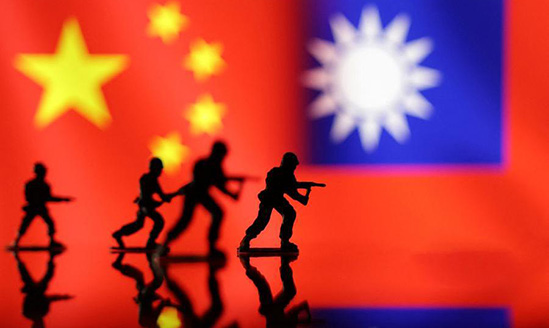
|
| |
With the world’s attention focused elsewhere, China's leadership appears more determined than ever to bring its neighbour under its control. But its growing use of military pressure has Taiwan fearing that it may invade the island. Chinese warships and aircraft conduct operations around Taiwan on a now near daily basis. However, as a major power with substantial diplomatic, economic and military clout. Beijing believes it now has a range of options to take the island, with several that would not require the need to physically invade it. Limited in natural resources, Taiwan is much more dependent on trade than other nations, and that could be its Achilles heal. Yes, in order to conquer Taiwan it would need to raise its flag over the territory, and subjugate its population. But unlike Ukraine, for example, it can't be resupplied via land, borders. And the eyes of Beijing, a nation cut off from the sea is a nation gasping for air (repeated). As with all Master plans, the devil is in the detail.
Taiwan, though much smaller than its age old historic cousin, is one of the wealthiest countries in the world per capita. At $153,201 it ranks at 5th in terms of net assets per individual, with china ranked at 34 with $17,267. Impressive obviously, but china dwarfs Taiwan if ranked by nation on almost every other level. After WW2 its manufacturing sector became key to its economic survival, much similar to say Japan. Life was good and business boomed, and so long as china remained inward looking things would stay that way. And they did until Chinas full accession into the world trade in 2001 after a 15 year negotiating period. Taiwan’s economy is now dependent predominantly on the tech industry, most notably in semi-conductors where in some sectors it has a virtual monopoly. Its leadership has tried to keep it that way, but with potential trade tariffs coming down the pipe from the trump administration, there appears to be little it can do. Global leaders like TSM Chave already announced plans to build plants in America, and regardless of government pressure or incentives to offset tariffs. In cases like these, the market is king, with shareholders calling the shots. Leaving Taipei powerless to act.
Similar to Japan, most of the island is rocky and that was considered an asset in case of a Chinese invasion making the island harder to conquer than say flat arable land. In terms of natural resources though it’s barren, making it one of the most trade reliant nations on earth. Only the Netherlands is more reliant on import/export Trade at 69% with Taiwan standing at 61%. The United States and China still have the world’s most resilient economies standing at 13 and 15% respectively. In Beijing these statistics have lead to alternative thinking on how it could bring the island under its control.
|
 |
| Taiwanese president Lai Ching-te offers deal to Beijing |
In the midst of this, it seems Taiwan’s leadership has done the sums and extended an olive branch, something unthinkable a decade ago. Taiwan’s leader Premier Cho Jung-tai proposed building economic ties such as the elimination of tariffs between the nations, giving each other access to each other’s markets. He went further, proposing military cooperation and intelligence sharing, something Beijing wants badly as it would give the entire pacific coastline of the mainland an enhance security blanket and more importantly. The caveat, being that Beijing would recognise the islands sovereignty, something that it has never done, and would go directly against its ‘one china’ policy.
Why would Taiwan do such a thing? Is it to offer Beijing something it could never accept, or hope that America comes to its aid, and builds a naval base there perhaps? Is it to give its tech sector access to Chinese markets (the largest in the world), and in doing so stop large parts of the sector relocating to the U.S.. The semi-conductor industry accounts for more than half of its exports, 38% and 15% of its military spending. Keeping that sector would be a smart move, if it guaranteed its sovereignty. In fact to keep its independence after the way china dealt with democratic protesters in 2020 were is worth a lot more than that if you think about it. Maybe the foremost reason for the change in approach could lie in the islands geography, and the economic challenges that brings. |
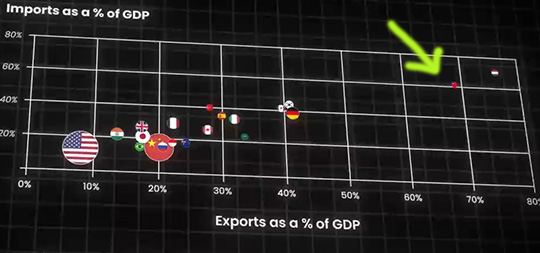 |
| Taiwans inport/export % of GDP stats. source U.N. Comtrade |
ISimilar to Japan, most of the island is rocky and that was considered an asset in case of a Chinese invasion making the island harder to conquer than say flat arable land. In terms of natural resources though it’s barren, making it one of the most trade reliant nations on earth. Only the Netherlands is more reliant on import/export Trade at 69% with Taiwan standing at 61%. The United States and China still have the world’s most resilient economies standing at 13 and 15% respectively. In Beijing these statistics have lead to alternative thinking on how it could bring the island under its control.
Add into account the mix that Taiwan imports 97% of its energy from overseas, one of the highest on earth. Oil, coal and gas total 89% of its energy imports. However, its stockpiles are low. Taiwan only has five months of crude oil reserves, one month of coal reserves and less than two weeks of natural gas reserves for electricity generation. That’s not a lot to go on. Even more important than having electricity is making sure people have enough food. Taiwan imports up to 70% of its food. If the imports were cut off, Taiwan's food stockpiles would last for about 12 months. So while the island's geography gives it natural defences, it also has disadvantages. In the eyes of Chinese policy makers this is vulnerability worth exploiting
In 2006, the Science of Campaigns textbook, published by China's National Defence University, argued that the most optimal way to subdue Taiwan is to surround the island using large formations of navy and air forces and sever economic and military connections with the outside world. That right, a blockade, one designed to cut off the resources needed for nearly 24 million people. If China could inflict enough pain on Taiwan for a prolonged period, it could enforce capitulation. The report updated in 2016 went further, that suppose an incident was to happen by the Strait of Taiwan. Beijing could use that to instigate a blockade under the pretence of a humanitarian mission, China could establish a quarantine zone that covers Taiwan and set new terms for who can enter and leave it.
The purpose of this would be to coerce companies and governments to submit to China's terms and in doing so, undermine Taiwan sovereignty claims. Moreover, unlike an invasion, a grey zone blockade would not necessarily be interpreted as an act of war. This final point is crucial. If the Chinese Coast Guard were to lead the mission instead of its navy. America would find it more difficult to intervene militarily than in an outright invasion. So in case of a blockade, law enforcement and civilian ships would play a fundamental role. China's Coast Guard and maritime militia would be chief among these. |
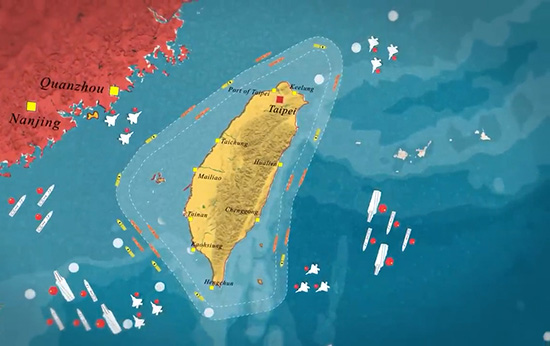 |
| how a Chinese blockade of Taiwan may look in its final stages |
If China were to impose a blockade, it would start by publicly announcing a customs inspection for all cargo and tanker vessels entering Taiwan. The Chinese Coast Guard would be authorized to board ships, conduct onsite inspections and question personnel. Non-compliant companies would have their market access pulled back. On the surface, this approach would seem fairly innocent. Just file the appropriate paperwork with the Chinese authorities in advance. And Taiwan is open for business.
No big deal right?. However, by complying, Taiwan would effectively lose its sovereignty and slope into a slow surrender. China wouldn't even need to seal the entire island to reach its goal. Cutting Taiwan's trade by 50% would prove detrimental, especially if China were to stop all imports of oil, gas and coal, which would lead to power failures across the island, without enough supplies Taiwan's political will and Would weaken, making it harder to resist. Adding insult to injury, Taiwan only has so many deep water ports, Cao Zhong___, for instance, is Taiwan's busiest port accounting for more than 50% of Taiwan's maritime trade. You get the picture.
The Coast Guard could begin patrolling the nearby waters and stop vessels that are non-compliant with the new customs regime. Chinese ships would likely enter Taiwan's 24 nautical mile contiguous zone, but stay out of the 12 nautical mile territorial seas. This would carry a lot of symbolism by crossing into the contiguous zone. Beijing would be sending a message that it does not recognize Taiwan's claims to these boundaries. Even by just appplying these measures offshore around____port, it could inflict serious economic harm on the economy. Depending on the level of escalation China could deploy ships to the __opposite port shore as wellto encircle the island entirely in support of its coast Guard. |
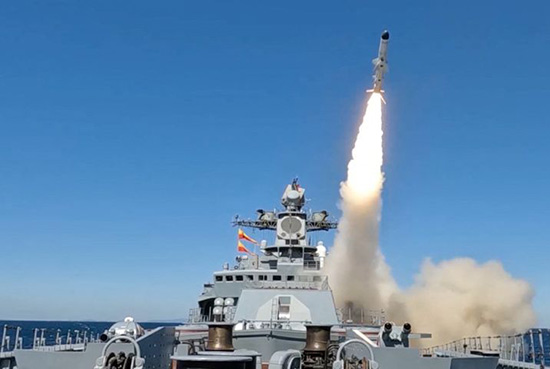 |
| The PLA Rocket Force could lauch missiles to deter interference |
China's navy would take a backseat in the blockade, but they would nevertheless deploy to all corners of the island. The PLA Navy has trained precisely for this scenario. This would then open Taiwan to a full out war, which it may not be able to win. China's Coast Guard is the largest in the world in terms of ocean going vessels, matching Taiwan’s Many times over. However, to calm international outcry, Beijing could reduce the number of inspections or focus strictly on Taiwanese owned vessels. The terms would be entirely up to Beijing, most likely in case of a blockade. The threat alone could compel most shipping companies to either comply with the new customs regime or delay shipments to Taiwan altogether. In general, though, China's objective would be to coerce the majority of foreign ships to submit to the new regulations, but do so just below the threshold of conflict that would drive the U.S. and its allies to come to Taiwan's aid.
Suppose Coast Guard led blockade isn't enough to force Taiwan to give in. In that case, Beijing could have its Navy lead the blockade. Submarines could deploy sea mines at the entrances of Taiwan's largest ports and energy facilities .Nearby, caution is the Yong on LNG terminal, the country's main LNG facility. Strategic sites such as these would be fair game for the play. If needed, Beijing could put the shipping industry on notice. Unauthorized cargo ships and aircraft entering the quarantine zone would first be warned and then fired upon if they don't comply. In this instance, regional shipping insurance rates would jump and shipping conglomerates could even halt traffic to Taiwan altogether.
At the same time, China could establish an unofficial no fly zone over Taiwan's air defence zone. The PLA Air Force would look to establish air superiority in the zone and steer away unauthorized aircraft. China could even team up with Russia and hold joint strategic aerial patrols over the East China Sea, similar to those they have conducted together since 2024 in the Barents Sea. These patrols would serve to deter Japan and nearby American forces from intervening. As a show of force, The PLA rocket force could hold exercises of its own. Its arsenal of 1800 conventional missiles is one of the worlds largest. Taiwan is well within the range of these weapons, but in a blockade operation. These missiles would be primed to deter outside intervention rather than initiate a confrontation. |
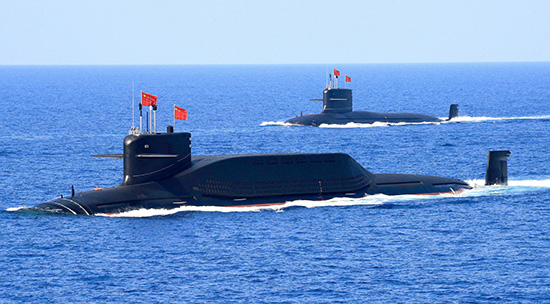 |
| Chinese submarines could destry Taiwans internet cables |
It could also isolate Taiwan digitally turning to the sea floor. Taiwan relies on more than a dozen undersea cables for the bulk of its Internet service. China could disrupt these lines and leave the island in the dark, this could be done far out to sea. In response, Taiwan could switch to low earth orbit satellite Internet as a contingency. It recently signed a contract with the French satellite company Eutelsat to provide satellite Internet in the event that its communications network is damaged. However, the bandwidth would be too low for mainstream civilian use. All things considered, with its vast resources, China could shut down Taiwan for months on end, though it would probably pause occasionally to allow negotiations to take place. And so for Beijing, a blockade would be preferable to war, even if it comes with greater uncertainty about how the international community would respond.
But Taiwan's reaction shouldn't be taken lightly, though. If it proves resilient and somehow receives assistance from the United States or others, China may find it difficult to force the island into capitulation without an invasion. Soon after, things could go horribly wrong. Taiwan has teeth of its own, and while its rugged terrain leaves it shy of natural resources, it would be prime real estate for guerrilla warfare. Beijing knows this, and while it may be able to roll up the flag, keeping it there could be costly. So it begs question, will china accept Taipei offer, build towards a blockade or go all in on an invasion? Whose to know, maybe the answer is somewhere in the middle?
|
|
|
|